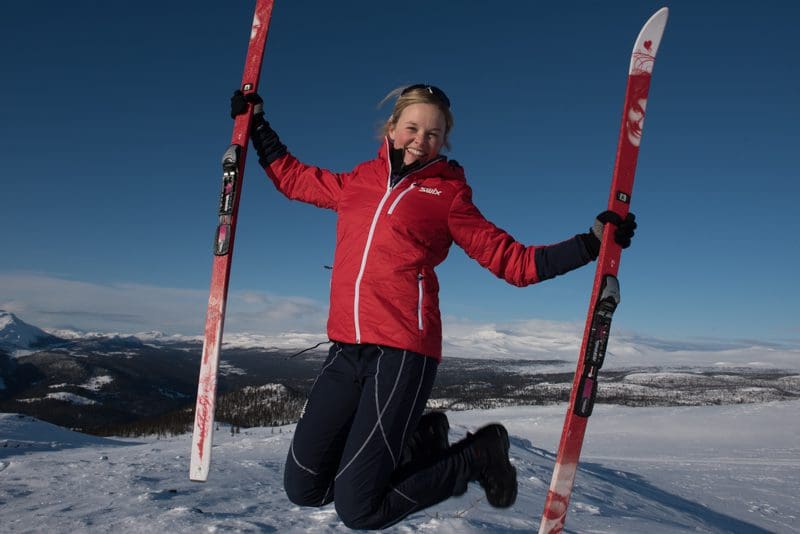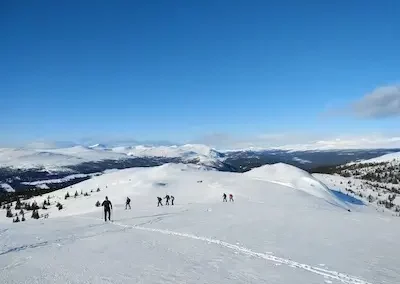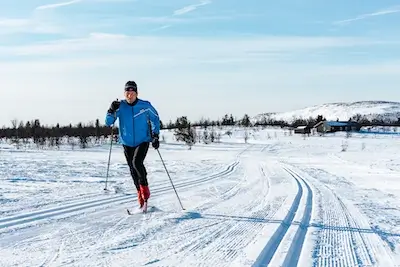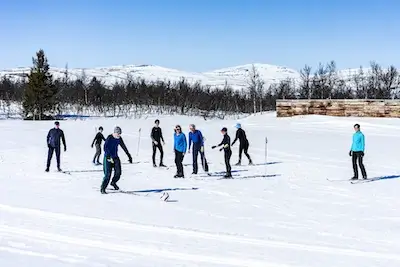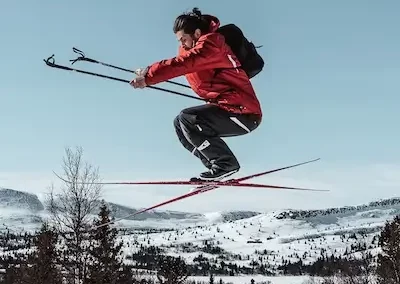Set yourself up for a great time on skis. Preparing yourself for your cross country ski holiday.
You have researched and booked your holiday, booked your travel and you’re excited! What next? How about preparing yourself to be ready to ski?
Even 10 minutes a day a can make a difference to your enjoyment of your holiday. In this article I’ll outline what we can all do to get ready for skiing and set ourselves up to have a great time on skis.
In a nutshell:
- Improve your ability to balance on one leg
- 10 minutes a day can make a big difference
- Core stability is key
- Good aerobic fitness will make your holiday more fun
- Strength can be improved without the gym
- Start early, take it steady and keep going
- Check out the resources at the end of the article
- Good luck and enjoy!
What do you enjoy most about cross country skiing? What do you hope to do on this ski holiday? What do you aspire to?
Answering these questions will help you decide how best to prepare for your cross country skiing holiday. At Venabu our guests enjoy their cross country skiing for a variety of different reasons.
They enjoy
- the fun and excitement of gliding on snow
- learning a new activity or developing existing skills
- exploring and travelling through a beautiful winter landscape
- the athletic challenge
- sharing an active holiday with like-minded people
How do you have fun on your skis?
I’m fascinated by the way people move and how that makes us feel. As a ski instructor and Pilates teacher it’s what I do, and I love that we have so much potential for change. Here are three principles that I find particularly encouraging:
- our bodies respond and change according to the demands we put on them (or not)
- given good health, there is no age at which we stop improving our fitness with training
- we can significantly improve our skiing using ‘off-snow exercises’
To get ready to ski there are some things that are better addressed without skis on, in the lead up to our holiday, such as improving our “core stability” and our ability to balance on one leg.
In fact I’d go so far as to say that pre-holiday preparation can transform your cross country skiing and your holiday. Now that’s a bold statement, so how might we go about it?
We get better at what we practice, specifically ☺. So which activities will make a difference to our skiing and what level of effort are we are aiming for?
The different elements of fitness for cross country skiing
Fitness has different components, including: cardiovascular (CV), endurance, strength and “core stability”, power, balance, flexibility and let’s not forget: skilful movement.
Before we feel overwhelmed, the good news is that many activities improve more than one element at the same time, so choose well and you’ll develop the whole picture. Phew!
CV fitness
Improving this helps us
- with endurance and delays fatigue
- enjoy skiing with a group
- feel comfortable versus feeling at your limit
At Venabu the tours in our Classic Cross Country Ski Holiday range from a few kilometres up to about 18 kms, and longer for our Offtrack Nordic Ski Tours. Some of this distance we are getting ‘for free’, gliding downhill, but mostly we are actively skiing. This gives us a good starting point for our preparation.
Are we, as a minimum, regularly walking the distance that we plan to ski? Are we walking on the flat or do we take in some hills too? Do we sometimes walk at a pace where we feel out of breath?
If we want to be athletic skiers are we running, cycling or performing other higher intensity exercise?
When we think logically we can see how we might start to prepare for our skiing holiday, and there is an added bonus – regular walking or other aerobic activity has many benefits for our physical and mental health. Time spent exercising in nature is now recognised to be even better for us, as described in this article from The Woodland Trust. This is a message we may now be familiar with after the last 18 months…
We want to know that our timeis well spent and we will see the benefits, there is useful guidance on the NHS website.
Strength, core stability and balance
Strength
- gives us propulsion on our skis (legs and arms)
- means we can get up more easily after a tumble
- gives us more stamina
- helps us ski up and down hills
- helps us to cope with different types of snow
Core stability – the foundation of good ski technique, closely related to balance
- is vital for developing power on our skis
- reduces the risk of injury
- reduces aches and pains e.g. low back pain
if that’s an issue you recognise then working on your core stability with professional guidance from a physiotherapist may help.
Good balance is essential for
- weight transfer
- stability on a gliding ski
- managing different snow conditions and changes in speed
Progression when learning, and to ski well, requires complete weight transfer from one ski to the next. We are balancing on one ski as it glides – can we stand and balance on one leg at home on a carpet? How long before we wobble over?
How to develop better balance
If standing one one leg is a challenge then we can practice, and with practice we will get better ☺
If we really struggle then we may need more strength too. The classic exercise quoted to improve balance is to stand on one leg every time you clean your teeth.
Activities and sports that challenge our balance can help us develop our balance in a progressive way, including Pilates, yoga and dancing.
There are definite overlaps here, exercises using only our body weight can be very effective – such as SkiFit (more below), Pilates and some styles of yoga.
Flexibility
- supports good technique
- can reduce the chance of injury
We want to be strong throughout a movement and not just bendy.
Skill – learning good ski technique has its own reward: good technique feels really good ☺
Injury prevention and more fun
Being fitter and prepared for our holiday can also reduce the chances of injury, for example, having the stamina to continue skiing effectively at the end of your tour.
Feeling energised rather than tired is something to look forward to while on holiday. We can enjoy the company of others more, take in the beautiful landscape and revel in the nordic winter light.
I’m in! When should I start?
Joseph Pilates, who founded Pilates, said, “You will feel better in ten sessions, look better in twenty sessions, and have a completely new body in thirty sessions.”
How to follow that? Exercise or activities we enjoy and can fit into our lives, and do consistently, are likely to have the most lasting benefit.
A progressive plan makes a big difference: in sensible steps, we do more over time, rather than just repeating the same distance or routine. This helps to avoid disheartening plateaus and keeps us motivated.
A note on injury prevention: sometimes with great enthusiasm people make changes too quickly or in too large increments. They ‘overload’ their body too soon and get injured. Giving yourself more time to prepare and doing so in a progressive way will reduce the chances of injury and make for more sustainable changes.
Staying motivated and enjoying the process
Dr Rangan Chatterjee has some great suggestions on ‘health snacks’ – small, easy things we can do in five minute sessions, making these changes part of our daily lives.
Athletic skiing
If we want to ski athletically then following a structured, progressive plan with increasing time or distance and including some ‘interval training’ will support that result. If athletic skiing appeals to you it’s likely that you are already participating in sport. Modifying your regular programme to be more ski specific in the lead up to your holiday can work wonders, and changing a routine (progressively) can bring many cross training benefits.
Our Become a Better Skier! course combines top level ski coaching with Pilates-based dryland training, an individual action plan to take away and coaching follow up. We aim to give you an all round package designed to help you become the skier you want to be.
Resources
SkiFit originated at La Clinique du Sport, Chamonix. Although the programme is aimed primarily at alpine skiers, following it could transform your cross country skiing. There are programmes for BikeFit, RunFit and TriFit on there too.
We don’t earn any commission on these links I just mention these providers because I have confidence in their quality and I’m a fan.
Before you start, if you have any health concerns please discuss them with your GP.
“Excellent guiding team!”
“An amazing week. The whole guiding team was excellent and very patient for me as a beginner. Music in the evening and a relaxed, friendly atmosphere. Hope to be back soon.”
Josephine (UK)
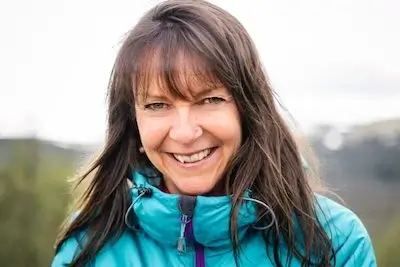
Joy O’Flanagan is an experienced BASI Nordic Ski Instructor and International Mountain Leader. She is also a movement specialist: a qualified physiotherapist and Pilates instructor.

